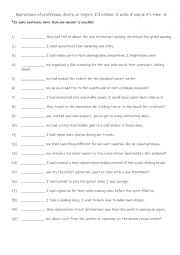
|
A2-B1 Expressions of preference, desire, or regret I�d rather, I wish, if only & it�s time 4
Students should learn expressions of preference, desire, or regret like "I�d rather," "I wish," "If only," and "It�s time" because they help them communicate personal feelings, make choices, and reflect on past experiences or future possibilities in English. These phrases allow students to express what they want, what they regret, or what they feel...
Level: elementary
Age: 10-100
Type:
Downloads: 159
|
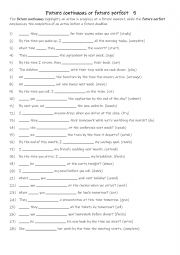
|
A2+-B1 Future continuous or future perfect 5
Understanding these tenses allows students to communicate future goals, schedules, and timelines effectively, enhancing both their speaking and writing skills for academic, professional, and everyday use. First, students need to familiarise themselves with the 2 tenses and their use. Then they read the sentences to work out which tense is needed to...
Level: elementary
Age: 10-100
Type:
Downloads: 143
|
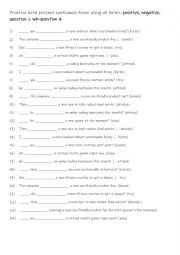
|
A1-A1+ Practise with present continuous tense using all forms positive, negative, question & wh-question 4
Each form is used 6 times! Answers on page 2.
Level: elementary
Age: 7-100
Type:
Downloads: 151
|
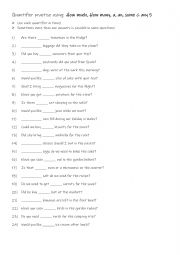
|
Quantifier practise using: How much, How many, a, an, some & any 5
Students first familiarise themselves with the 6 quantifiers and their use. Then they complete the gap-fill with the correct word. Each quantifier is used 4 times! Answers on page 2.
Level: elementary
Age: 7-100
Type:
Downloads: 153
|
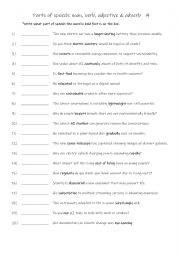
|
Parts of speech noun, verb, adjective & adverb 4
Learning parts of speech�nouns, verbs, adjectives, and adverbs�is essential because they are the foundation of English grammar. Mastering them helps students build grammatically correct sentences, communicate more effectively, expand their vocabulary, improve reading comprehension, and perform better in exams and writing tasks. Answers on page 2.
Level: elementary
Age: 8-100
Type:
Downloads: 153
|
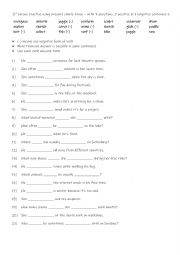
|
3rd person practise using present simple tense � with positive & negative sentences + questions 5
Students familiarise themselves with the 21 verbs. Then they read the sentences to see which question verb is required to complete the gap-fill. Each form is used 7 times! Answers on page 2.
Level: elementary
Age: 8-100
Type:
Downloads: 158
|
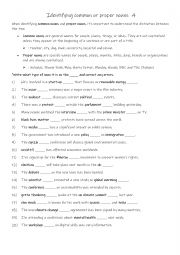
|
Identifying common or proper nouns 4
First, students need to familiarise themselves with the 2 types of nouns. Then they read the sentences to identify and use the correct punctuation for all of the sentences. Answers on page 2
Level: elementary
Age: 8-100
Type:
Downloads: 144
|
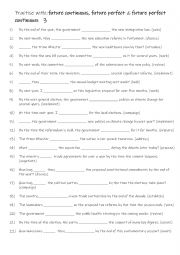
|
B1-B2 Practise with future continuous, future perfect & future perfect continuous 3
Students should learn the future continuous, future perfect, and future perfect continuous tenses to express a variety of future actions and events more clearly. The future continuous describes ongoing actions at a specific future time, the future perfect indicates actions that will be completed before a certain future point, and the future perfect...
Level: intermediate
Age: 10-100
Type: worksheet
Downloads: 135
|
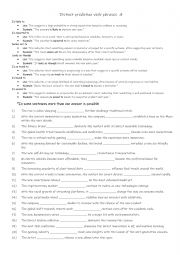
|
A2+-B1 7 Distinct prediction verb phrases 4
These phrases help express different levels of certainty about future events. "Is likely to" suggests something will probably happen based on evidence, while "is expected to" refers to something predicted or planned. "Seems set to" indicates something is prepared to happen soon, and "looks as though" is used when something seems probable based on c...
Level: elementary
Age: 9-100
Type: worksheet
Downloads: 145
|
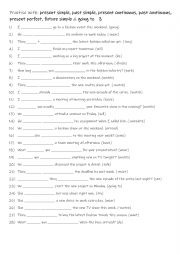
|
A2-B1 Practise with present simple, past simple, present continuous, past continuous, present perfect, future simple & going to 3
Practising these tenses allows students to speak confidently about everyday situations, past events, future plans, and hypothetical scenarios. It improves their ability to communicate with precision, enhances fluency, and prepares them for more advanced grammar. Mastery of these structures supports clearer expression of ideas and better understandi...
Level: elementary
Age: 8-100
Type: worksheet
Downloads: 152
|
|
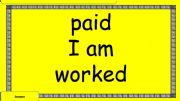
Rebus / Catchphrase / Dingbats
A fun way to remember compounds, common phrases, phrasal verbs, idioms and nouns. Part 2 of 3. Just click on answer on each of the 32 slides.
Level: intermediate
Age: 12-100
Downloads: 1928
|
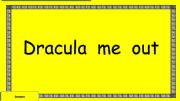
Rebus / Catchphrase / Dingbats
A fun way to remember compounds, common phrases, phrasal verbs, idioms and nouns. Part 2 of 3. Just click on answer on each of the 31 slides.
Level: intermediate
Age: 12-100
Downloads: 1953
|
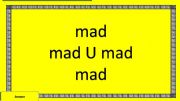
Rebus / Catchphrase/ Dingbats
A fun way to remember compounds, common phrases, phrasal verbs, idioms and nouns. Part 1 of 3. Just click on the answer on each of the 31 slides.
Level: intermediate
Age: 12-100
Downloads: 1949
|
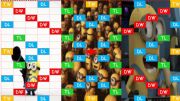
Scrabble - Minions for young learners
To be used with a projector and whiteboard. When the students go through a DW etc, click on the DW to remove it to enable the students to write the word on the whiteboard more easily. To encourage young learners to play Scrabble and remember spellings... they can spell any word as long as it joins a...
Level: elementary
Age: 6-10
Downloads: 2109
|
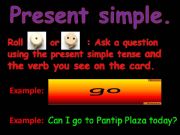
Present Simple
Students select 1-20 (hyperlinked for ease of use) then roll a dice and depending on the number make a positive / negative sentence or ask a question using the verb on the slide. If they are able to make a sentence / question using their meta-language, that student earns points for their t...
Level: elementary
Age: 8-100
Downloads: 2535
|
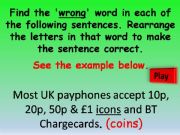
Fun with Anagrams
Students in pairs / groups read the sentence on each of the 20 slides, trying to find out the wrong word. Then rearrange the wrong word to make a more logical sentence. Good for a warmer or cooler too. Part 2 of 2
Level: intermediate
Age: 12-100
Downloads: 4149
|
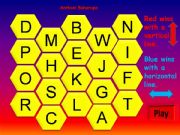
Blockbusters 2
I use this for revision of vocabulary / spelling / dictionary practise or phonetics. 3 slides with increasing levels of difficulty. Last 2 slides have initial consonant clusters. Normally I give each team elementary or advanced dictionaries. When the opposing team selects a letter the other team mem...
Level: intermediate
Age: 11-17
Downloads: 5758
|
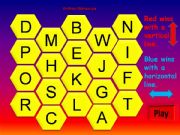
Blockbusters 1
I use this for revision of vocabulary / spelling and dictionary practise. 3 slides with increasing levels of difficulty.
Press the letter once for red
Press the letter twice for blue
Press the letter three times to return to yellow
Level: elementary
Age: 7-16
Downloads: 5883
|
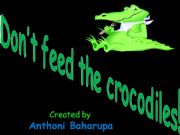
Don�t feed the crocs
A fun points system game for students who don�t want to be eaten. Put the class into four teams. - Assign each team one of the four characters. - Ask each team a question based on the day�s language / revision point. - If the team gets the wrong answer, click on their character to move it closer to ...
Level: elementary
Age: 5-8
Downloads: 2695
|
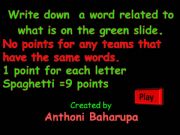
Categories
Students in pairs / groups select a slide from 1-25 then think of a word that is related to what is on each slide. If another team has the same word then both teams get no points. Great for revision and word association. All of the slides are hyperlinked for ease of use.
Best used with Mini-whiteb...
Level: elementary
Age: 8-16
Downloads: 2274
|
|
|






















